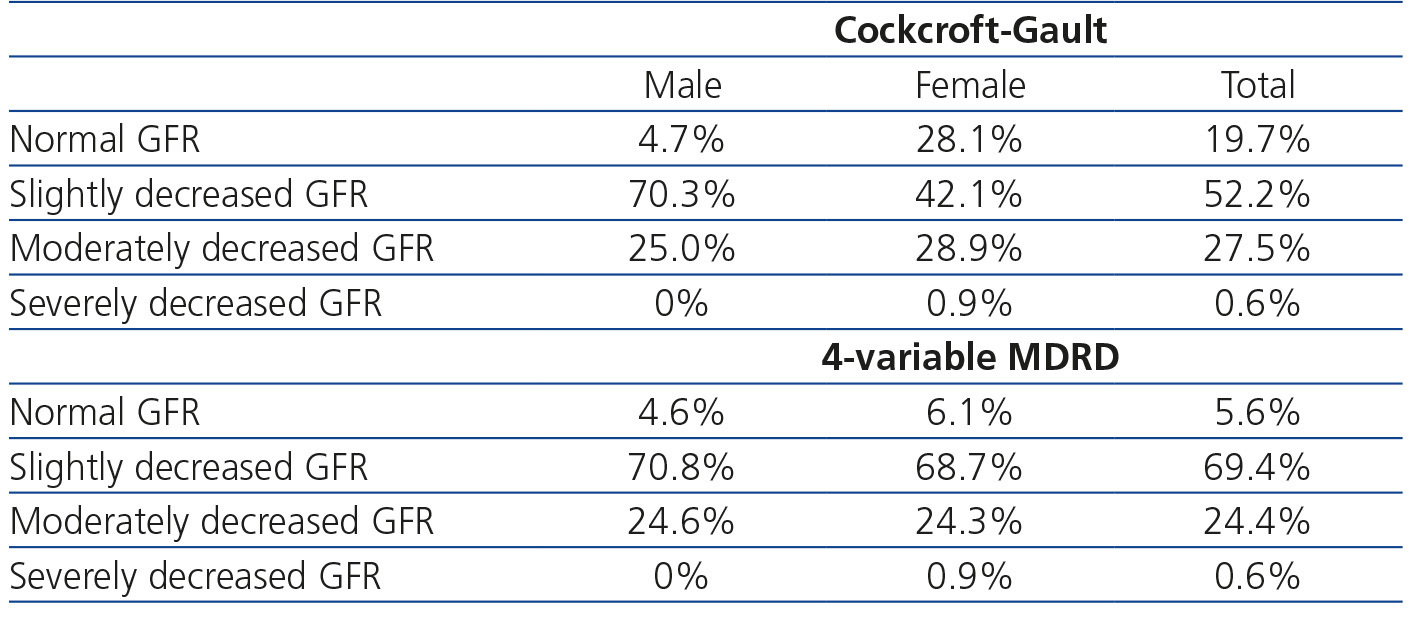To the Editor,
In Spain, around 11% of the adult population suffers from some degree of chronic kidney disease1, a figure that will progressively grow due to an ageing population and the increase in the prevalence of other chronic diseases such as diabetes mellitus, high blood pressure, dyslipidaemia and obesity.
We carried out this study with the objective of determining the percentage of patients with occult kidney disease using the Cockcroft-Gault (C-G) and/or the 4-variable MDRD (Modification of Diet in Renal Disease) equations as an indirect measurement of renal function, analysing the potential error made by exclusively assessing serum creatinine.
MATERIAL AND METHOD
We performed a cross-sectional descriptive study with adult patients older than 18 years of age, whose serum creatinine had been requested on at least two occasions in a one-year period in their health centre, excluding those whose tests showed high variability (greater than 0.5mg/dl of creatinine between the two tests).
RESULTS
A total of 183 patients were included with a mean age of 59.1±18.2 years, with 64.5% being female (mean age: 58.7 years vs. 60.0 years in males).
With regard to pathologies, 51.4% had high blood pressure, 27.9% were diabetic, 40.4% had dyslipidaemia and 11.5% suffered from some type of heart disease. 6.6% of patients had hyperuricemia (13.8% males, 2.5% females, p<.01). 5.5% were diagnosed with chronic kidney disease.
5.5% had kidney disease according to serum creatinine values (9.2% of the males and 3.4% of the females, p=.10). Using the C-G equation, 29.1% had a glomerular filtration rate (GFR) <60ml/min/1.73m² (25.0% of the males, 31.4% of the females, p=.37) and 25.7% using the 4-variable MDRD equation (24.6% of the males, 26.3% of the females, p=.81). Table 1 compares the percentages of patients in accordance with their GFR using both equations.
21.4% of patients according to the 4-variable MDRD equation and 25.0% according to the C-G equation had occult kidney disease.
With regard to drugs that are potentially dangerous for patients with a low GFR, it has been demonstrated that 40.0%-44.4% (depending on the equation used) of patients with stage 3-4 chronic kidney disease were being treated with non-steroidal anti-inflammatory drugs, 15.6%-18.0% with metformin, 15.6%-16.0% with oral anti-diabetic drugs and 6.0%-6.7% with allopurinol.
If we analyse the level of concordance obtained between the two equations, C-G2 and 4-variable MDRD3, we observe a level of concordance classified as very good (index κ 0.81±0.05, p<.001, χ2 test) (Table 2). In a more detailed manner, upon analysing the specific level of concordance of each stage of chronic kidney disease, similar results were obtained mainly in advanced stages. Thus, for stage 1, the level of concordance is weak (κ 0.39±0.09; p<.001; χ2 test), for stage 2, it is moderate (κ 0.56±0.06; p<.001; χ2 test) and for stage 3, it is very good (κ 0.84±0.05; p<.001; χ2 test).
DISCUSSION
Approximately one in every four patients in our study had a GFR <60ml/min/1.73m2 despite having creatinine values within the appropriate range. In similar studies, the percentage of patients with occult kidney disease varies between 10.4% and 43.5%, according to the study population4-6. We observed a more prevalent decrease in GFR in females, similarly to the aforementioned studies, although in our study, the differences observed were not statistically significant.
Most patients assessed had a slightly decreased GFR. The patients who had more marked GFR involvement were elderly patients with more cardiovascular risk factors, similarly to studies of similar characteristics carried out in Primary Care7.
In our study, high blood pressure, hyperuricemia and heart disease were the pathologies most associated with moderate-severe GFR involvement. Controlling these pathologies, as well as diabetes mellitus, must be one of our priorities, not only in order to slow down progression, but also to reduce cardiovascular risk, which is significantly associated with chronic kidney disease8-10.
The concordance found between the two equations (C-G and 4-variable MDRD) improves as the degree of GFR involvement increases, being very good in patients in stage 3.
In conclusion, the data show the ever increasing incidence of individuals with kidney disease in Primary Care clinics, probably due to an ageing population, concomitant diseases and the increase in medication use in general, and mainly medications that can affect renal function. We also noted the high percentage of individuals who had a decreased GFR despite maintaining normal plasma creatinine and who usually are undetected since their GFR is not estimated using a more reliable method.
Conflicts of interest
The authors declare that they have no conflicts of interest related to the contents of this article.
Table 1. Stratification of the glomerular filtration rate according to the values of the Cockcroft-Gault and MDRD-4 equations
Table 2. Concordance between the two equations used to determine the glomerular filtration rate










